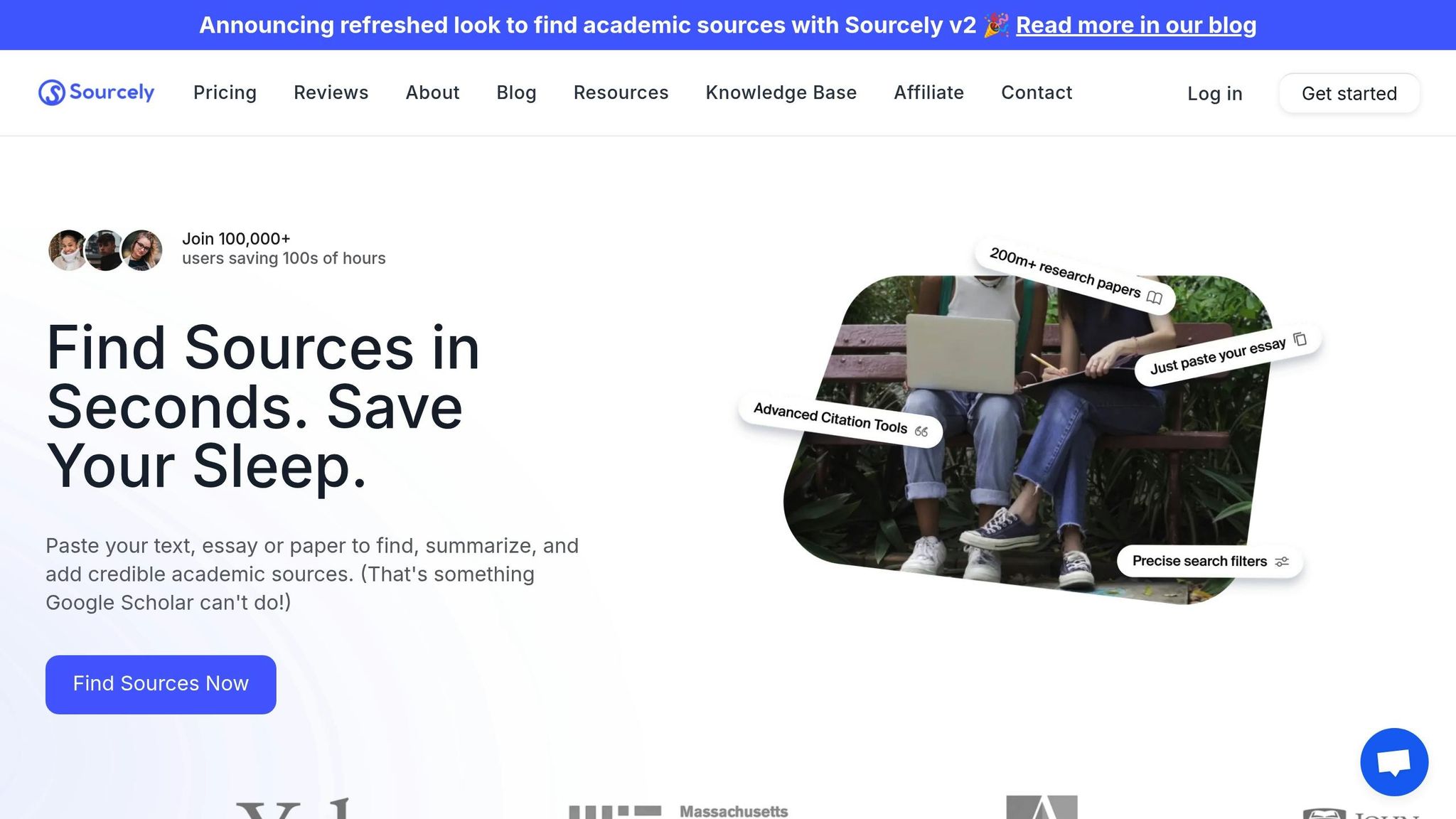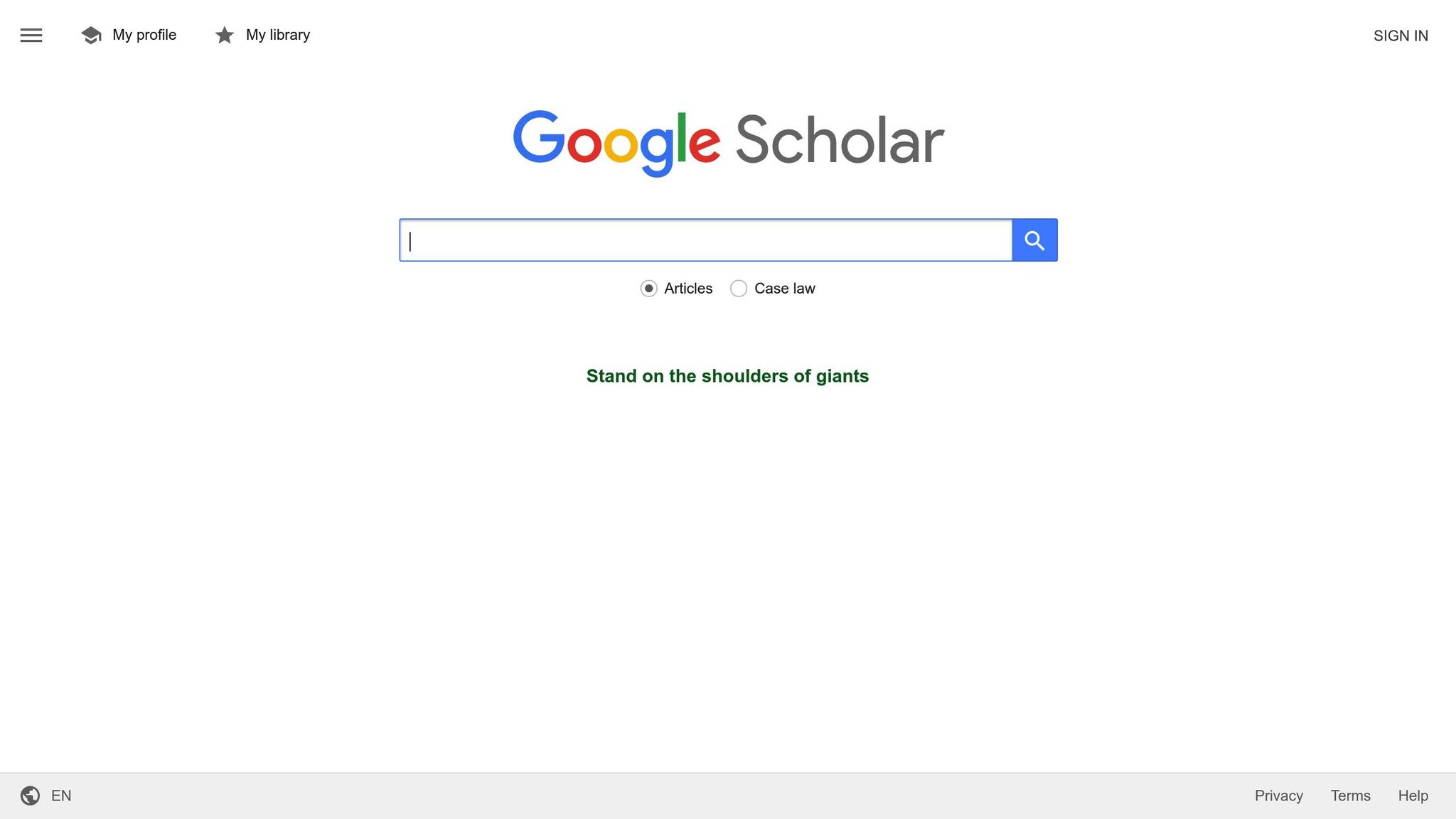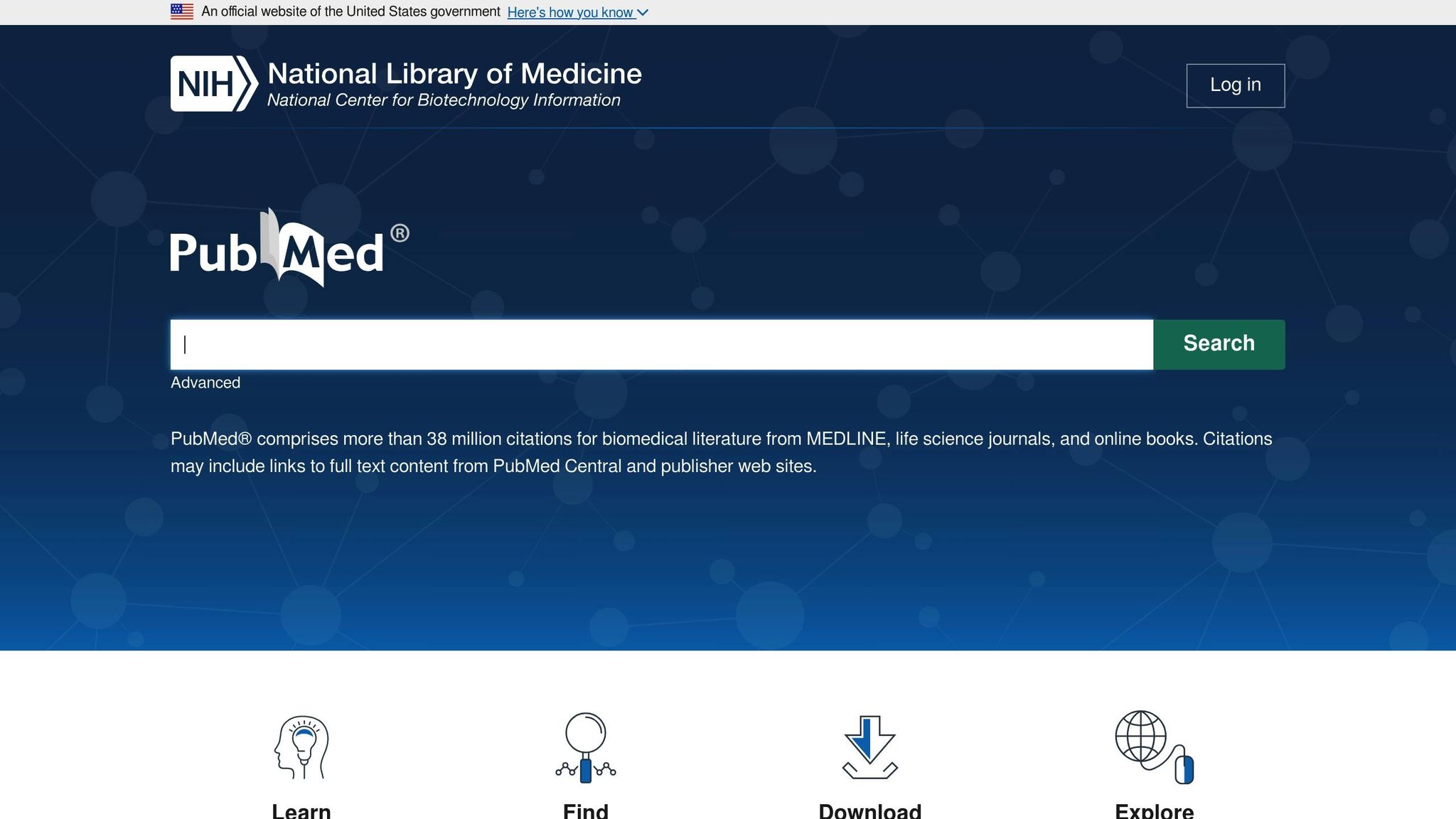
Best Academic Search Engines
Looking for the best tools to streamline your academic research? Here's a quick rundown of three top platforms:
- Sourcely: AI-driven with access to over 200 million papers, offering advanced filtering, summaries, and citation tools. Plans start at $7.
- Google Scholar: Covers 100 million documents across disciplines, with free citation tracking and author profiles. Access to full texts varies.
- PubMed: Specializes in biomedical research with 38 million citations, free abstracts, and full-text options through PubMed Central.
Quick Comparison
| Feature | Sourcely | Google Scholar | PubMed |
|---|---|---|---|
| Database Size | 200+ million papers | 100+ million papers | 38+ million papers |
| Search Options | AI-driven filters | Heuristic ranking, Boolean | MeSH-based search |
| Full-Text Access | Free PDFs for many sources | Varies by publisher | Abstracts, PMC access |
| Citation Tools | Built-in library, exportable | Citation tracking | Basic export |
| Special Features | AI summaries, text analysis | Author profiles | MeSH taxonomy |
| Cost | Starts at $7 | Free | Free |
Choose Sourcely for AI-powered tools, Google Scholar for broad coverage, or PubMed for focused biomedical research.
Best Search Engines for Scientific and Academic Research
1. Sourcely

Sourcely simplifies academic research with its AI-powered source discovery tools.
Enhanced Search Features
The platform uses AI to analyze your text, pinpoint citation-worthy sections, and recommend where to cite.
Access to Databases and Tools
Sourcely provides:
- Free PDF downloads for many sources
- Filters for year, author, and relevance
- Tools to organize references and export them in various citation formats
- AI-driven summaries of sources
Pricing Options
Sourcely offers flexible plans:
- Buy Credits: $7 one-time payment (up to 2,000 characters)
- Pro Membership: $17/month (full access, cancel anytime)
- Believer Plan: $347 one-time fee (3 years of access)
- Free Trial: Includes 300 characters
Efficiency Gains
With over 100,000 users, Sourcely helps researchers save countless hours by streamlining source discovery, summarization, and citation.
Next, let’s see how Google Scholar stacks up in terms of coverage and usability.
2. Google Scholar

After checking out Sourcely's AI filters, the next stop is Google Scholar, a platform that indexes around 100 million English-language scholarly documents. These include journals, theses, conference papers, books, technical reports, and even court opinions. Unlike Sourcely, which uses AI-powered summaries, Google Scholar relies on heuristic ranking to deliver relevant results.
Search and Coverage
Google Scholar ranks search results using several factors, such as:
- Full-text analysis
- Credibility of the publication venue
- Author expertise
- Citation count
- Recency of the document
It covers approximately 80% of English-language articles, with 40%-60% of them accessible in full text through publishers or repositories. This ranking system reflects the priorities of researchers, focusing on the quality of content, the publisher's reputation, the author's credentials, and citations.
Access Options
- Institutional Subscriptions: Link your library account to access paywalled articles.
- Open Access: Find free versions of articles through direct links or public repositories.
Additional Features
Google Scholar offers several tools to enhance research:
- Citation tracking to follow references and related studies
- Author profiles for exploring an expert's body of work
- Suggestions for related research to broaden your scope
These features make Google Scholar a valuable resource for researchers. By comparing its algorithmic ranking approach to Sourcely's AI-driven method, you can see how each serves different needs. Next, let’s dive into PubMed and its focus on biomedical literature.
sbb-itb-f7d34da
3. PubMed

For in-depth biomedical research, PubMed stands out with its specialized focus and detailed indexing.
Managed by the National Center for Biotechnology Information at the U.S. National Library of Medicine since 1996, PubMed is a free database dedicated to biomedical and life sciences literature. Unlike general academic platforms, PubMed uses Medical Subject Headings (MeSH) to help users find exactly what they need.
What’s in PubMed?
PubMed includes over 38 million citations and abstracts from biomedical and life sciences research. Its content comes from three main sources:
- MEDLINE: Citations indexed with MeSH terms for precise searches.
- PubMed Central (PMC): A free archive of full-text articles, including research funded by public institutions.
- Bookshelf: A collection of full-text books, reports, and documents focused on biomedical topics.
How to Access
- Free access to citations and abstracts via PubMed.
- Free full-text articles available in PubMed Central.
- Some journal articles require a subscription through publisher sites.
- Free books and reports accessible through Bookshelf.
Search Tools
PubMed offers powerful search options, including MeSH-based filters and direct links to full-text articles in PubMed Central.
Feature Comparison
Here’s a side-by-side look at the tools:
| Feature | Sourcely | Google Scholar | PubMed |
|---|---|---|---|
| Database Size | Over 200 million papers | Over 100 million papers | Over 38 million papers |
| Search Options | AI-driven text analysis; advanced filters | Boolean operators; citation tracking | MeSH-based search |
| Full-Text Access | Free PDF downloads | Varies by publisher | Abstracts; PMC access |
| Citation Tools | Built-in library; multiple formats | Tracks citations | Basic export |
| Special Features | AI summaries; text-based source discovery | Author profiles | MeSH taxonomy |
| Cost | Pricing plans available | Free | Free |
This breakdown showcases Sourcely's AI-driven tools, Google Scholar's broad coverage, and PubMed's focus on biomedical research - helping you pick the best fit for your needs.
Recommendations
When deciding on the right search engine for your project, consider these options:
- Sourcely: Ideal for handling complex projects. For $17/month, you get AI-powered essay analysis, source suggestions, and advanced filtering tools. A $7 trial is available to test it out.
- PubMed: Best for biomedical research. It offers free access to 38 million peer-reviewed abstracts and full-text articles.
- Google Scholar: Great for cross-disciplinary research. It provides free citation tracking across 100 million documents, though accessing full texts might require institutional credentials.
Start with Sourcely’s trial and use advanced filters on each platform to refine your search for the most relevant studies.